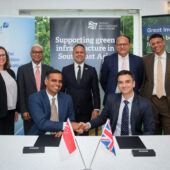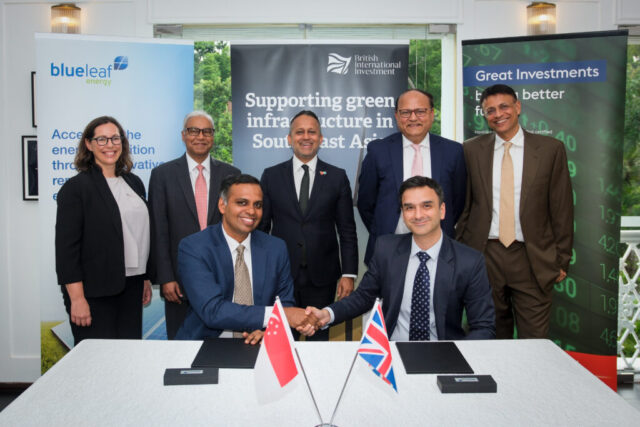Organisations seeking to boost impact investment in emerging markets and tackle nature loss took advantage of the global stage provided by the annual World Economic Forum to talk about key initiatives.

The annual World Economic Forum (WEF) meeting in Davos, Switzerland has provided a platform to highlight progress for impact-related initiatives, including the growing momentum behind a plan to generate $10bn (€9.2bn) of scale-up capital for 1,000 business in frontier markets, and the rapid headway being made with adoption of nature-related financial disclosures by companies.
The WEF-backed Humanitarian and Resilience Investing (HRI) initiative said more than 40 partners had announced over 50 commitments to boost impact investment in frontier markets, following a “call to action”, announced in September 2023.
The initiative aims to mobilise $10bn from governments, development finance institutions, development organisations, donors, foundations, investors, investment facilitators and companies to enable 1,000 businesses in frontier markets to scale up their operations by 2030. HRI claimed commitments so far have the potential to unlock over $15 billion in commercial and catalytic capital.
The HRI Initiative also said it was launching three new themes for collaborative action – building and maturing selected frontier markets, scaling action at the intersection of climate and humanitarian impact and cultivating co-investment in purpose-driven businesses in frontier markets.
Cliff Prior, CEO of the Global Steering Group for Impact Investment (GSG), described the initiative as a transformative movement towards sustainable impact investment.
“By unlocking investments in frontier markets and addressing the intersection of climate change and humanitarian needs, we are setting a new paradigm in impact investment, creating resilient, empowered communities and driving meaningful change where it matters most,” he said.
Other initiatives
Other commitments announced by HRI included initiatives to develop and harmonise new impact measurement methodologies, the launch of new funds and financing mechanisms, and programmes to create enabling market conditions and promote market transparency.
On building frontier markets, HRI cited the example of a drive to provide better market conditions for piloting a new approach to scaling up businesses in northern Kenya, led by the Kenyan and US governments. Other organisations involved include the African Development Bank, Bamboo Capital Partners, Kenyan-based CrossBoundary, IKEA Foundation, the Overseas Development Institute and the World Bank Group
For the scaling action for climate and humanitarian impact theme, HRI and the WEF’s Giving to Amplify Earth Action (GAEA) announced a multi-stakeholder initiative to develop private-public-philanthropic partnerships to support and scale projects addressing the impacts of the global climate and nature crisis on vulnerable communities. Among organisations taking part in this are Acumen, the International Committee of the Red Cross (ICRC), International Rescue Committee (IRC), Private Infrastructure Development Group (PIDG) and United Nations High Commission for Refugees (UNHCR).
On cultivating co-investment in purpose-driven businesses, the HRI Initiative said it launching a new area of work to promote collaboration in impact investments. Partners include Global Impact Investing Network (GIIN), GSG, the African Private Capital Association, Collaborative for Frontier Finance, Swiss philanthropic investor elea, the Global Private Capital Association and investment manager KOIS. HRI said these organisations reached over 1,000 capital providers investing in impact.
GIIN CEO Amit Bouri said achieving impact for the most vulnerable communities would require investment in areas where it has typically not gone.
“For us to be successful, it is critical to expand frontier finance and help develop financing and partnership models adapted to the unique conditions of these markets,” he said.
TNFD reports rapid adoption of disclosure framework
Meanwhile, the Taskforce on Nature-related Financial Disclosures (TNFD) said 320 organisations from more than 46 countries had already committed to making nature-related disclosures based on TNFD recommendations published in September 2023. These organisations have said they plan to adopt the recommendations and publish TNFD-aligned disclosures in their annual corporate reporting starting in the 2025 financial year or earlier.
Those committing to making nature-related disclosures include publicly listed companies representing US$4 trillion in market capitalisation, and financial institutions representing $14trn in assets under management, according to the TNFD. In all, they include 178 companies, 106 financial institutions, 18 market service providers and 18 other organisations, including NGOs, development organisations, and public sector institutions. Notable adopters include Norway’s sovereign wealth fund and seven of the 29 Globally Systemically Important Banks (GSIBs).
Rapid uptake in the four months since the framework was unveiled underscores growing interest globally in reversing biodiversity loss that led to the signing of the Global Biodiversity Framework in December 2022.
The taskforce, launched in June 2021 with backing from G7 and G20 governments, is providing a framework which it hopes will underpin company reporting on nature-related issues in a similar way to those already in use for climate change impacts. Efforts have been made to make the rules as compatible as possible with existing sustainability reporting standards such as those produced by the International Sustainability Standards Board (ISSB) and the Global Reporting Initiative (GRI), to ease the path to adoption across jurisdictions.
David Craig, co-chair of the TNFD, said adoption of the framework by such a diverse range of organisations was a milestone moment for nature finance and corporate reporting.
“As climate-related sustainability reporting goes mainstream through the new ISSB standards and regulation in a growing number of countries, this is a clear signal that investors, lenders, insurers and companies are recognising that their business models and portfolios are highly dependent on both nature and climate and need to be treated as both strategic risks and investment opportunities,” he said.





